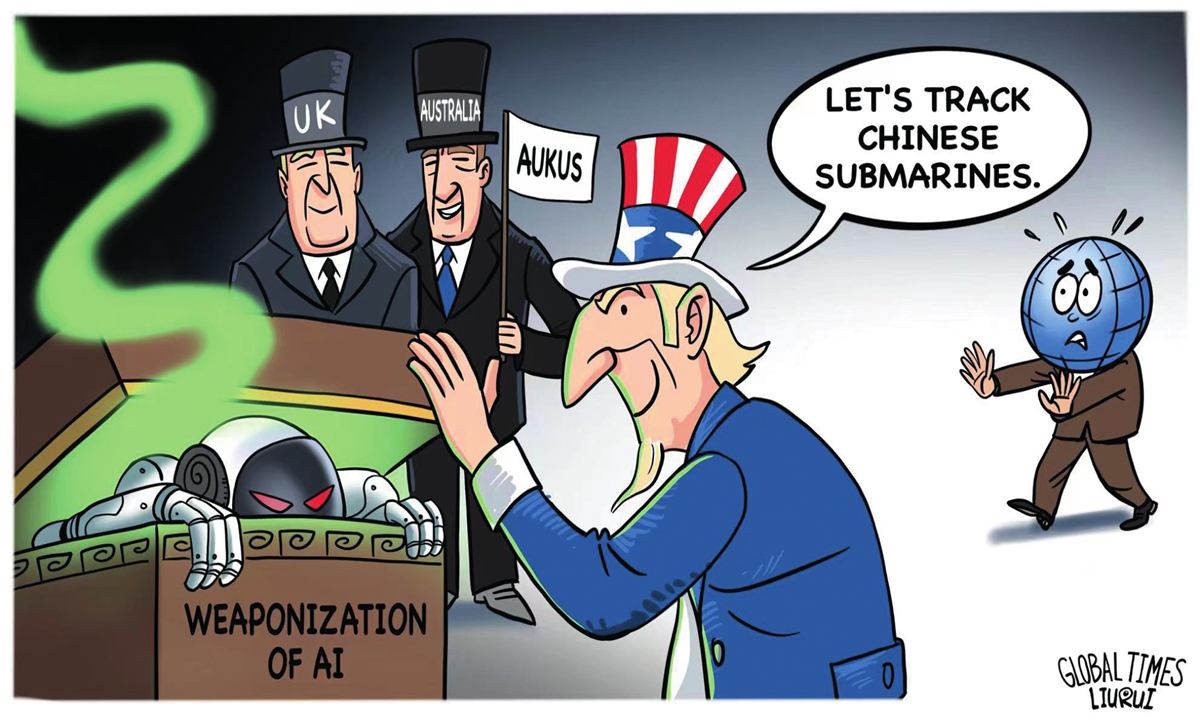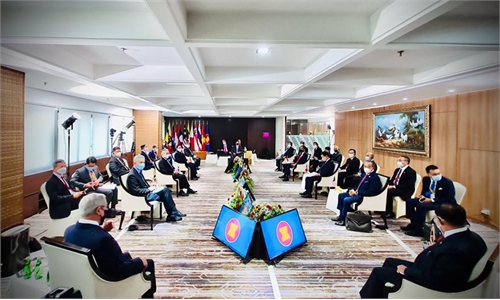
Pandora's box of AI weaponization. Illustration: Liu Rui/ GT
After the meeting of defense ministers from the US, the UK and Australia, or AUKUS, held on Friday, they announced an "ambitious" high-tech cooperation plan, which was widely interpreted as dealing with Chinese targets in space and the Chinese submarines in the Pacific. Apparently, they are trying to contain China whose military power is rapidly growing.According to the new plan, the US, the UK and Australia will build a ground-based radar in their respective countries to enhance "space domain awareness" and improve the ability to detect, track and identify deep space objects. The first radar, to be built in Western Australia, is expected to be operational by 2026, with the other two due to be completed by 2030. The radar systems will protect the three countries' communications and navigation satellites to monitor "emerging threats in space," allowing them to detect, identify and track threats in space up to 36,000 kilometers away.
In addition, AUKUS also plans to increase the complexity and scale of maritime autonomous systems and improve real-time awareness of the sea area. They will install advanced AI algorithms on the P-8A anti-submarine patrol aircraft. These AI algorithms will perform real-time processing of data obtained from micro-sonobuoys launched into the ocean. The goal is to be able to track the Chinese submarines under the waters of the Pacific Ocean as quickly as possible.
For the US, it's most worried about three things when it comes to China: In the event of war, China will be able to destroy American space reconnaissance and navigation satellites; China's hypersonic missiles; and the Chinese navy's large number of underwater submarines. This high-tech cooperation of AUKUS is a long-term plan to try to abolish China's above-mentioned capabilities.
The US Navy is far more powerful than China's, but China has the largest number of surface and underwater ships. Coupled with China's huge missile attack capabilities, the US' maritime superiority empowered by aircraft carriers is put in jeopardy. Since China has already conducted anti-satellite experiments and hypersonic weapons experiments, and also owns a space station, Washington's confidence in space has been facing setbacks. They want to restore their "absolute confidence," and are eager to transfer AI technology to military use as quickly as possible.
AUKUS is starting with high technology, trying to put the military power developed by China into a cage woven by the latest technologies such as AI. This has strengthened the belief that China can only avoid being locked by AUKUS by accelerating its own progress. AI is bringing about a new technological revolution. The methods and scenarios of military struggle may be reshaped. The significance of technology may be unprecedented.
After reading the news reports of the AUKUS defense ministers' meeting, many high-tech suppliers complained that a large amount of the new plan was kept secret, preventing them from understanding what the militaries of the three countries actually wanted. This enhances people's thoughts that this high-tech plan of AUKUS has subversive ambitions - they are trying to "subdue the Chinese dragon" through high-tech means.
We don't have a moment to lose. We need to be clear that the high technology of AI is being added to AUKUS' military system to deal with China, and it has increased their arrogance in "leaving behind China" in military technology in the next stage. Speeding up our own high-tech research and development so that our military technology can run much faster than the US and its major allies who try to outflank us from the front is China's only choice, and we must do this. China has no time and space to hesitate and explore other options. The Chinese people love peace, but dignified peace can only exist in a strategic balance where the US and its allies are propelled to accept the fact that China's core interests are inviolable.
The author is a Chinese media professional. opinion@globaltimes.com.cn



